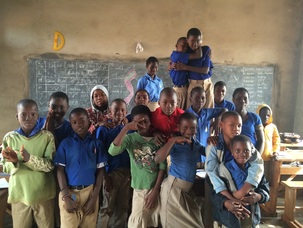"Why don't you know the answer? Why don't you know the answer? We studied this! I will hit you!"
The teacher goes through the class calling on each student, none of whom can give a correct answer. It never occurs to him that if all of his students don’t know the answer, perhaps he hasn’t taught it well enough. Some students line up to receive their beating, others wait anxiously on their benches and the teacher has to hold them in place as he slaps their hands with the stick.
 One of Scott Goldstein's classes.
One of Scott Goldstein's classes. All of these problems exist in so much of the world, but we can't ignore the reality that in the United States, we have students that disappear into the background of overcrowded classrooms, teachers who practice discipline in ways that exacerbate bad behaviors, and instruction that doesn’t meet learners where they are. In our search for answers to these persistent problems, we've placed a big emphasis on the debate over how we prepare teachers for the classroom. And in that debate, we cannot underestimate the importance of learning and practicing good pedagogy—pedagogy based on research of best practices and the knowledge of experienced educators. After all, it doesn't necessarily take a two-year, master’s program to learn the importance of teacher "wait time,” differentiating for student learning styles, or the logical sequencing of a good lesson. Practicing those things, however, and the routine of trying to do them all simultaneously while presented with classroom management issues and other interruptions of the day? That takes years to master.
At the annual YEP-DC Policy-to-Practice conference two years ago, the keynote address was given by Principal David Pinder of McKinley Technology High School in D.C. gave the keynote address. In his speech he made the point that when he interviews potential hires he places top priority on their knowledge and passion for their own subject matter, he said, because teacher enthusiasm rubs off on students. I agree with the sentiment, but we can’t rely so heavily on content knowledge at the expense of pedagogical skill. In many circles of the education policy world, including on this blog, we have lamented the fact that many teachers come from the bottom half (or third) of their graduating classes and our multiple paths to entering the teaching profession produce less respect for the profession and less qualified professionals than in fields like medicine or law. While this is true, let’s not forget that good teaching is not all about IQ, natural talent, and personality. Good teaching is learned. We can’t raise the standards of the profession by putting our K-12 classrooms in the same conundrum as our universities, where teachers are experts in their fields but don’t know how to teach.
Part of the answer may lie in the other half of Pinder’s equation: The emphasis on subject matter expertise was paired with Master Teaching Academies at his high school, where first-year teachers teach only one class and instead, focus intensely on learning to teach from master educators. That idea is critical because the practice of putting good pedagogical practices to work on a daily basis too often takes a back seat to a teacher’s more pressing daily concerns — making materials, grading, extracurricular activities, and more. This concept creates the necessary space for teachers to effectively learn pedagogy and bring it into the classroom.
Back in Togo, we’re observing in another school and the end of the class is approaching. With only about three minutes left, the instruction proceeds as normal until the bell. There is no “closing” and the students ultimately produced no evidence of learning, but before they leave, the teacher reminds them sternly to study what they learned today at home. As the lesson ends we proceed back to the front office of the school where the teacher asks us if we have any feedback on his lesson.
The school director jumps in: “No — you have to ask them if they have any negative feedback!”
Inside I still feel like smacking my palm to my forehead, Homer Simpson-style, over and over again. But they’re asking for advice, and that’s a great place to start. After all, most teachers are in this profession because they genuinely want to help their students learn. Let’s make sure they know how.
Want to attend this year's YEP-DC policy-to-practice conference? More info and registration details here.
Scott Goldstein, guest blogger, is a D.C. based teacher and teacher trainer spending this school year training teachers abroad in Indonesia, Togo, and Mexico. He was a blogger for Recess in 2013-14. Reach him via email or Twitter.

 RSS Feed
RSS Feed